In the heart of the Sacred Valley lies Potato Park, a shining example of community-based tourism that highlights the region’s rich agricultural heritage. Visitors experience sustainable farming practices and the preservation of diverse potato varieties, crucial to the local diet and culture. Engaging with community members through traditional ceremonies and culinary tastings, travelers gain insight into the significance of ecological balance. Yet, the park’s contributions extend beyond tourism; they also play a vital role in enhancing local livelihoods and promoting environmental stewardship. What happens when tourism intertwines with indigenous practices?
Key Points
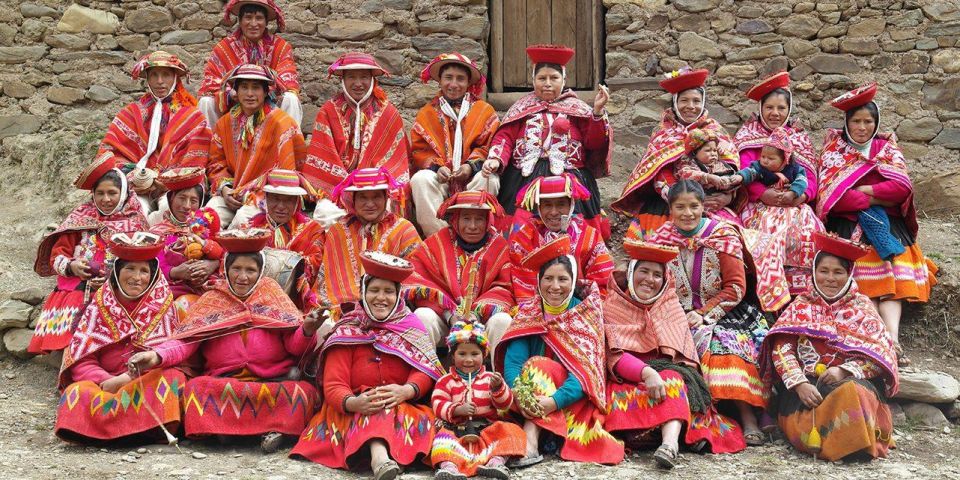
- Potato Park in the Sacred Valley emphasizes community-based tourism, focusing on local agricultural biodiversity and traditional practices, especially diverse potato varieties.
- The immersive tours offer engaging experiences in sustainable farming techniques while promoting awareness of environmental conservation initiatives.
- Participants enjoy a 7-hour tour that includes hotel pickup, a live guide, culinary tastings, and interactions with local communities.
- The tour features a traditional welcome ceremony, enhancing culture and appreciation for local customs and agricultural biodiversity.
- Sustainable practices demonstrated during the tour foster ecological balance and support local livelihoods, contributing to the preservation of the environment.
Overview of Potato Park
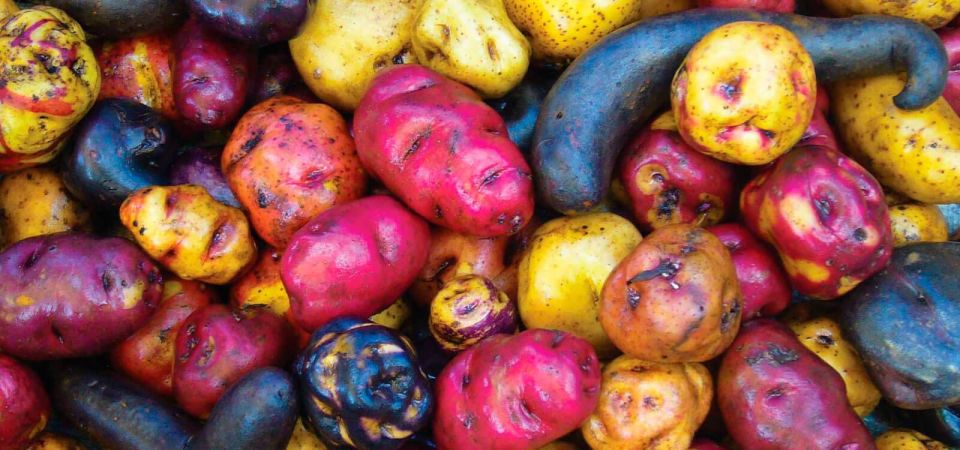
Nestled in the breathtaking Sacred Valley, Potato Park is a vibrant community-based tourism initiative that celebrates the rich biocultural heritage and agricultural biodiversity of the region.
This unique park focuses on preserving local agricultural practices, particularly the cultivation of diverse potato varieties, which are crucial to the Andean culture.
Visitors can enjoy the scenic beauty of the Andean mountains and the serene Kinsaqocha Lagoon while learning about the area’s sustainable farming techniques.
Through interactive experiences with local communities, guests gain insights into the significance of potatoes in local diets and traditions.
You can also read our reviews of more tours and experiences in Cusco.
Tour Details and Pricing
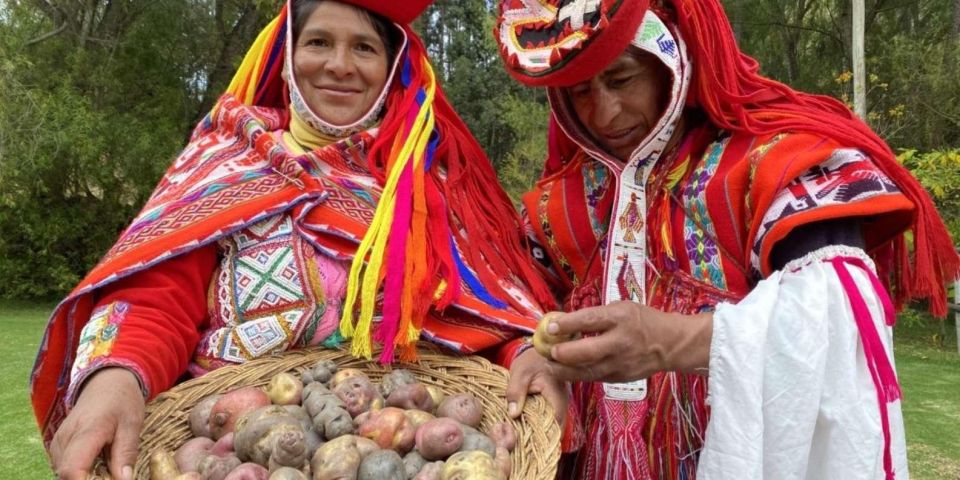
Potato Park offers an immersive 7-hour tour experience that combines cultural engagement with breathtaking landscapes, all for a starting price of $120.00 per person. This tour accommodates up to 15 participants, ensuring a personalized experience.
It includes a live tour guide fluent in Spanish, providing insights into local traditions and biodiversity. Guests can enjoy free cancellation up to 24 hours in advance for a full refund, along with a convenient reserve now and pay later option.
Each tour features essential inclusions like hotel pickup, transportation, lunch, and snacks. However, participants should bring a passport or ID, sun protection, and a daypack.
Please note, smoking, alcohol, and drugs aren’t permitted during the tour.
Itinerary Highlights
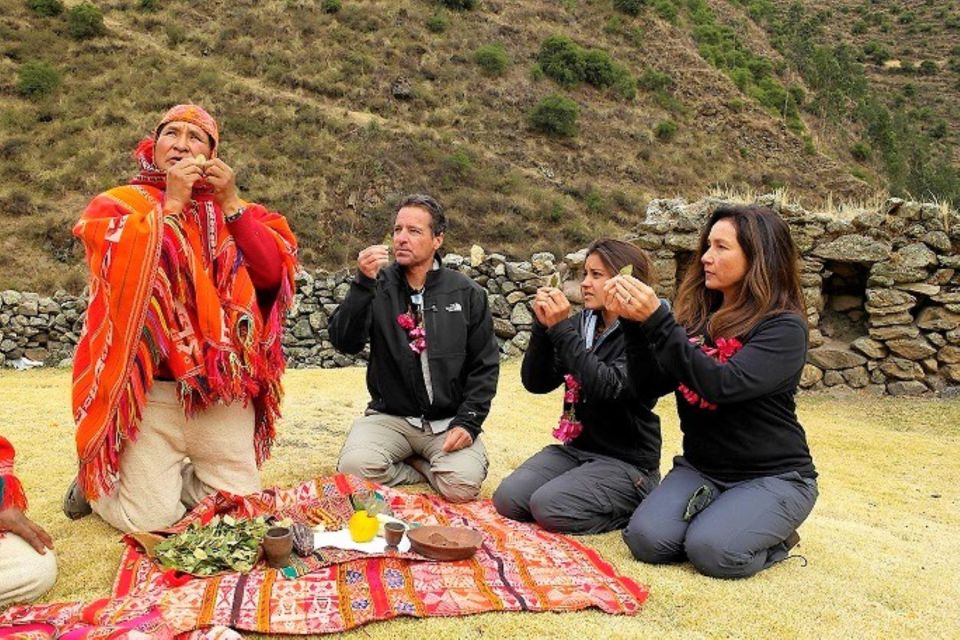
Participants will kick off their adventure with a hotel pickup at 8:30 a.m. in Pisac, setting the stage for a day rich in cultural and natural exploration. The itinerary includes a visit to the community of Paru Paru for a warm welcome ceremony, followed by an insightful interpretation of Potato Park’s local potato varieties. They’ll enjoy a tasting session from the Women’s Culinary Art Collective Qachum Waqachi and learn about potatoes’ role in climate change adaptation. A brief walk through Kinsa Qocha will showcase local flora and fauna, culminating in a typical lunch at Chawaytire featuring local ingredients.
| Time | Activity | Location |
|---|---|---|
| 8:30 a.m. | Hotel pickup | Pisac |
| 10:00 a.m. | Welcome ceremony | Paru Paru |
| 12:00 p.m. | Culinary tasting | Qachum Waqachi |
| 1:30 p.m. | Lunch | Chawaytire |
Inclusions and Exclusions
The tour package includes essential amenities such as hotel pickup, transportation, a knowledgeable official tour guide in Spanish, a delicious lunch, and a tasty snack.
Participants can enjoy a seamless experience exploring the rich biodiversity of Potato Park without worrying about logistics.
However, it’s important to note what’s not included. Meals not mentioned in the itinerary are excluded, so guests should plan accordingly for any additional dining needs.
On top of that, any extra expenses, such as souvenirs or personal items, aren’t covered in the package price.
This clarity ensures that travelers can fully engage with the tour while remaining aware of potential out-of-pocket costs.
More Great Tours NearbyWhat to Bring
Essential items for a successful day at Potato Park include a valid passport or ID, sunglasses to shield from the sun, and a sun hat for added protection against UV rays.
Visitors should also pack a camera to capture the stunning landscapes and unique cultural experiences. Sunscreen is crucial for preventing sunburn during the outdoor activities.
Staying hydrated is important, so bringing a reusable water bottle is recommended. Cash may be necessary for any additional purchases, such as local crafts.
A daypack can help keep belongings organized and easy to access. Preparing with these essentials ensures a comfortable and enjoyable adventure in the breathtaking Sacred Valley while exploring the rich biodiversity of Potato Park.
- From Cusco: Huchuy Qosqo 2-Day Horse Riding Trip
- From Lima: Magic Peru With Cusco and Puno 7d/6n + Hotel **
- Cusco: Archaeological Sites + Picnic + Painting
- Cusco: All-inclusive 6D/5N Tour of Machu Picchu, Rainbow Mountain
- Ausangate Tour 7 Lagoons With Hot Springs Pacchanta
- From Cusco: Inca Trail 2 Days 1 Night – Private Tour
Community Engagement
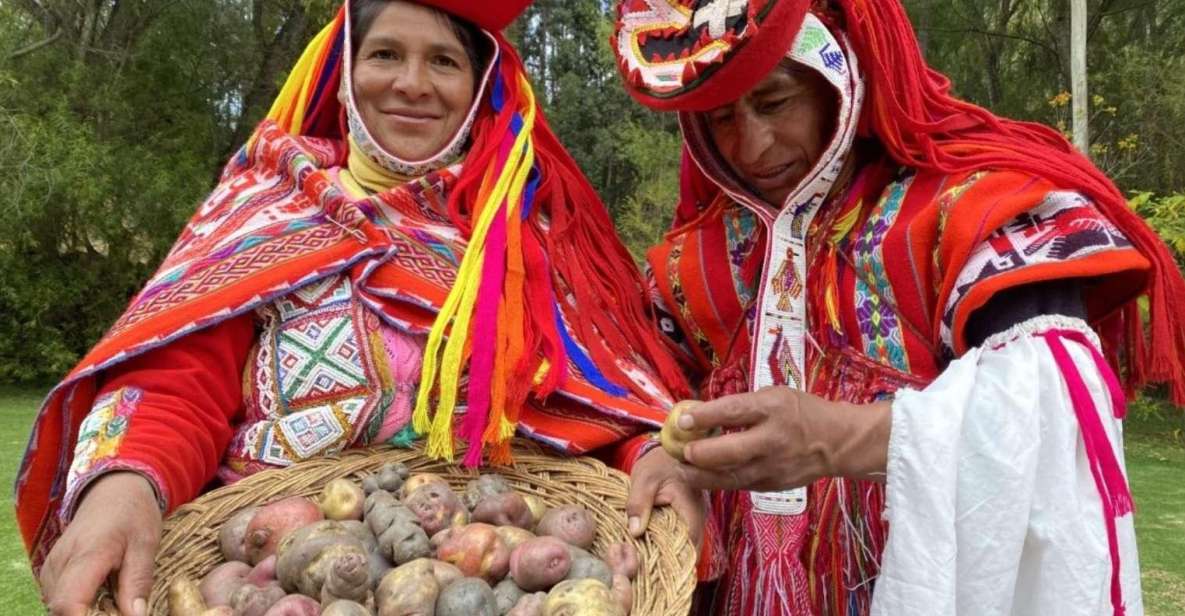
Engaging with the local community is a fundamental aspect of the Potato Park experience, allowing visitors to connect with the traditions and sustainable practices that have shaped this vibrant culture for generations.
Participants enjoy the welcoming atmosphere of the Paru Paru community, where a traditional welcome ceremony sets the tone for the day.
Visitors learn about the diverse local potato varieties during guided interpretations, enhancing their appreciation for agricultural biodiversity.
The Women’s Culinary Art Collective Qachum Waqachi offers a unique tasting experience, showcasing local culinary traditions.
Environmental Impact
Exploring Potato Park not only immerses visitors in the rich cultural tapestry of the Sacred Valley but also highlights the importance of sustainable practices that protect the environment and local biodiversity. The park’s initiatives promote ecological balance, conserve traditional agricultural methods, and safeguard native species.
| Environmental Aspect | Impact |
|---|---|
| Biodiversity Conservation | Protects local plant species |
| Sustainable Agriculture | Reduces chemical use |
| Water Management | Improves local water quality |
| Community Education | Raises awareness on sustainability |
Through guided tours, visitors witness firsthand the efforts to maintain this delicate ecosystem while supporting the community’s livelihoods. This blend of cultural and environmental stewardship offers a model for responsible tourism.
Frequently Asked Questions
What Is the History of the Potato Park Community?
The community’s history revolves around preserving indigenous agricultural practices, fostering biodiversity, and celebrating local culture. Through collaborative efforts, they’ve maintained traditional potato varieties, ensuring sustainable farming methods while empowering local families and enhancing cultural heritage.
How Does the Tour Support Local Farmers?
The tour directly supports local farmers by promoting their unique potato varieties, providing a platform for them to showcase their agricultural practices, and encouraging visitors to appreciate and purchase locally sourced products, enhancing community livelihoods.
Are Children Allowed on the Tour?
Children are welcome on the tour, but parents should ensure they can handle the activities. The experience offers a unique learning opportunity for families, fostering appreciation for local culture and biodiversity while enjoying the beautiful landscape.
Can I Participate if I Don’t Speak Spanish?
He can’t participate comfortably if he doesn’t speak Spanish, as the tour guide only provides information in that language. However, he might consider finding a bilingual companion to enhance the experience and understanding.
What Wildlife Can I Expect to See During the Tour?
During the tour, visitors can expect to see diverse wildlife, including various bird species, unique Andean flora, and possibly small mammals. The natural beauty enhances the experience, making it a memorable exploration of the region’s biodiversity.
Recap
Potato Park offers a unique opportunity to explore the rich agricultural heritage of the Sacred Valley while supporting local communities.
By participating in immersive experiences and engaging with traditional practices, visitors not only learn about the importance of biodiversity but also contribute to sustainable tourism.
This initiative highlights the delicate balance between culture and ecology, ensuring that the vibrant traditions of the region thrive for generations to come.
A visit to Potato Park is both enriching and impactful.
You can check availability for your dates here:More Tour Reviews in Cusco
Not for you? Here's more nearby things to do in Cusco we have reviewed
- From Cusco: Vinicunca Rainbow Mountain ATV Tour with Meals
- Cusco: 7 Lagoons of Ausangate Full Day
- Humantay Lake 1 Day Tour Review
- Private Machu Picchu 1 Day Tour From Poroy Cusco
- 25 Best Tours In Cusco
- 25 Best Guided Tours In Cusco
- 25 Best Shopping Tours In Cusco
- 10 Best National Park Tours In Cusco
- 8 Best Drinking Tours In Cusco
- Deluxe Travel Package 5 Days Cusco & Machupicchu & 4*Hotel.
- Private Transportation to Laguna Humantay From Cusco
- Rainbow Mountain Quad Bike Day Trip
